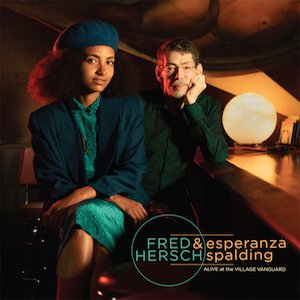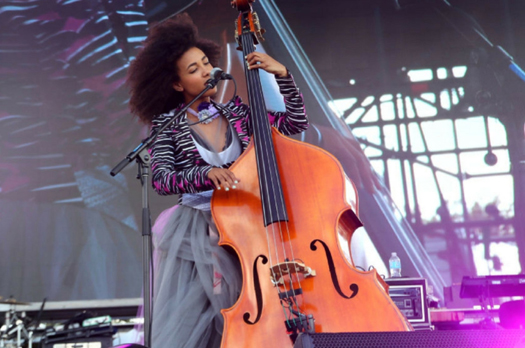Pianist/composer Fred Hersch and vocalist/bassist/songwriter esperanza spalding (stylized in all lower case) can both be counted among the most acclaimed and inventive artists in modern jazz. The Village Vanguard is the music’s most revered venue, having played host to countless legendary musicians and beloved live recordings. The duo and the club converge for a magical performance on Alive at the Village Vanguard, a rare opportunity for listeners to enjoy the singular and thrilling collaboration between two marquee jazz artists at the top of their game.
Alive at the Village Vanguard showcases the astonishing chemistry shared by these two master musicians, who bring out distinctive aspects in each other’s playing. Hersch and spalding have convened for only a handful of New York City performances since their first meeting in 2013 during the pianist’s annual duo series at the Jazz Standard. In that limited time, the pair has developed a wholly personal approach, not only in the annals of piano-voice duets but in their own already-highly individual practices.
Taking the stage with no set arrangements and only a vague sense of the repertoire they’ll explore, the dauntless pair delights in playing without a safety net. “This recording sounds like you’re in the best seat in the Vanguard for a very live experience,” says Hersch. “You can really feel the vitality of the room, of the audience, and of our interplay. We decided on the word Alive for the album title as you can really feel the intimacy and energy of the performances.”
Alive at the Village Vanguard marks Hersch’s sixth recording from the storied club, where he’s been invited to headline three weeks annually for many years. The album also vividly spotlights Hersch’s stunning sensitivity and engagement as a duo partner; in recent years, he’s worked in a similar setting with such incredible musicians as guitarists Julian Lage and Bill Frisell, clarinetist/saxophonist Anat Cohen, saxophonist Miguel Zenón, and trumpet maestro Enrico Rava.
“Playing with Fred feels like we’re in a sandbox,” spalding says. “He takes his devotion to the music as serious as life and death, but once we start playing, it’s just fun. I like to live on the edge in my music, but I find myself trying things that I usually wouldn’t when I play with him, finding new spaces to explore in the realm of improvised lyrics.”
Always a determined original in her own projects, spalding rarely sings standards, and her approach here is unique to her partnership with Hersch. She’s revealed on this outing as not just a phenomenal scat singer but a charming and imaginative improvisational storyteller. The Gershwins’ “But Not for Me” becomes a witty, poetic extemporization on the lyric itself, examining the changes in language represented by the original’s sometimes archaic terminology. Neal Hefti and Bobby Troup’s chauvinistic ditty “Girl Talk” comes under barbed scrutiny from not only a feminist but also an eco-conscious perspective.
“I don’t think anybody’s heard esperanza sing like this,” Hersch says. “She’s a fearless vocalist, and is one of the biggest talents I know. She’s got a huge reach in her intellectual knowledge and is a big thinker in both her projects and in her outlook.”
Hersch’s preternatural reflexes, profound emotional expressiveness and unparalleled gift for interpreting and reimagining repertoire with each new performance are on mesmerizing display throughout the album. His “Dream of Monk” has been a staple of the duo’s sets since the beginning. With lyrics penned by the pianist himself, the tune is a dedication to one of the pianist’s most indelible influences.
“Some Other Time” is a Sammy Cahn/Jule Styne song, less well known than the Leonard Bernstein classic of the same name but a favorite of Hersch, who weaves an elegant and vivid tapestry during his mesmerizing solo. Egberto Gismonti’s “Loro” is launched by spalding’s unconventional scatting, which she eventually uses to engage in a nimble dance with Hersch’s propulsive piano.
Though it’s hard to believe given the buoyant spirits and playful interaction of the performances, both spalding and Hersch were working through pain on the October 2018 weekend that this music was recorded. Although the stint ended on a celebratory note with the occasion of Hersch’s 63rd birthday, he was also scheduled to enter the hospital the very next day for hip replacement surgery. “I was in a lot of pain and walking with a crutch,” he recalls. “Just getting down the famous stairs to the Vanguard was an ordeal, but once the music started the pain disappeared completely.” spalding, meanwhile, was struggling with family issues while juggling an intense schedule that included writing an opera with the master composer Wayne Shorter and beginning a teaching position at Harvard University. “I was going through a very difficult time in my life,” she admits. “I was miserable every day when I got to the Vanguard, so I had to decide to plug into the capacity for this music to heal. I wanted to emanate something positive even though I was feeling so horrible. Neither of us were feeling well in our lives outside of the music, so the stage of the Vanguard became an alchemizing place for both of us, and I think you can feel that in the music.”
Without major arrangements, this piano-voice duo recording captured live at New York’s Village Vanguard, shows off the many musical qualities of Fred Hersch and Esperanza Spalding. The pair imbues most of the tunes with a quirky perspective and humor, but I felt this work more as an audience entertainment rather than an audio recording to be revisited.
Gershwin’s “But Not For Me” swings in rubato time with theatrical posture and a kind of jocularity in the words. Spalding’s vocal solo is followed by Hersch’s contrapuntal notes professed in different registers of the piano. The musicians waste no time showing melodic agility on “Dream of Monk”, a tune with lyrics from the pianist, which had been previously included on his 2012 trio album Alive at the Vanguard (with bassist John Hébert and drummer Eric McPherson). Due to its nature, there’s an ample improvisational window turned into playful and intuitive interaction. Monk’s mysterious ways are evoked and exhaled at every breath with fluid changes of rhythm and intonation.
The homage to the iconic pianist of “Round Midnight” is intensified with a rendition of one of his tunes: “Evidence”, here made wondrous in detail by Hersch after a responsive introduction. The vocalist shines on the latter piece but finds new spaces on “Loro”, where the Brazilian folk complexities of its composer, Egberto Gismonti, is dismantled by an effortless communication with her accompanist. Their deep-seated instinct takes the form of a slinky celebration on Charlie Parker’s calypso-bop flavored “Little Suede Shoes”, where there’s an inclination for percussive extended techniques and the low registers.
“Girl Talk” is made rightfully critical by Spalding but didn’t catch my ear, just like “A Wish”, the discreet closing number penned by Hersch and Norma Winstone and firstly recorded in 2003 to be included on their duo album Songs & Lullabies.
Mostly traditionally low-key, this is an album to be played once, not twice… and here comes Monk again!







More Stories
Interview with Janis Siegel of The Manhattan Transfer: Jazz, being a more refined, interpreted form of music
CD review: George Benson – Dreams Do Come True: When George Benson Meets Robert Farnon – 2024: Video, CD cover
The band was tight as ever. The Warren Haynes Band cuts loose: Video, Photos